The Best Games You Probably Missed in 2017
A mixture of indies and quietly noteworthy mid-tier games are what you should spend your holiday vacation catching up on.
This article first appeared on USgamer, a partner publication of VG247. Some content, such as this article, has been migrated to VG247 for posterity after USgamer's closure - but it has not been edited or further vetted by the VG247 team.
It's been the most wild year for video games in recent memory. It felt like for every month there were at least five super good, can't-miss games. Probably more so than the average person, I kept up with most of the year's latest and greatest titles. Inevitably, there were a bunch I saw slip between the cracks; relegated to only hyped whispers and nothing else. I felt like I enjoyed them alone.
Some smaller games, of course, busted through the discourse like it was a jug of Kool-Aid ruining a family home. The free-to-download Doki Doki Literature Club became a surprise hit of the fall season, particularly because of how it twisted the visual novel genre. Elsewhere other independently developed games made their marks, from Getting Over It with Bennett Foddy (from the creator of QWOP) becoming an out-of-nowhere, low key streaming sensation to players fawning over the pristine architecture of the isometric open world game Tokyo 42.
The good thing about 2017 is that even the small games broke through the noise a lot, even as bigger games mostly dominated conversations. But not always. Below are 11 games this year that might have passed you by, and are worth checking out in the new year if you can find the time. (Or if you have already played them, kudos. You're doin' good in life, I hope you're healthy because I sure as hell am not after all the games I stayed up way too late playing this year. But what the heck! The more games, the merrier I say.)
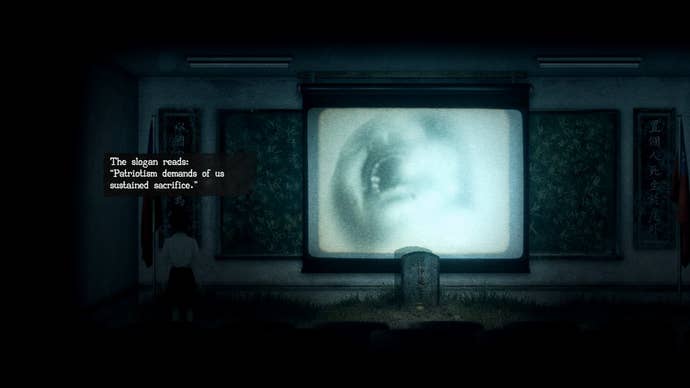
Detention
Available on: PS4 for $12.99; PC, Mac, Linux for $11.99; Coming Soon to Switch
It's not every day where as soon as I finish a game, I ravenously start reading about the historical period it's based on. But that's exactly what I did after I played Detention from Taiwanese studio Red Candle Games. Detention's a survival-horror game that takes place within the White Terror period of Taiwan, where the country was living under strict martial law. It was a harrowing time for over 38 years, where around 140,000 Taiwanese were imprisoned on the basis of opposing the Chinese Nationalist Party that ruled the government, whether it was true or just perceived; during this era, thousands were also executed.
The historical context, just on its own, is horrific. And yet, Detention manages to sidestep feeling exploitative. In fact, it feels the opposite. It's educational, without being obviously so. It's haunting, without drenching the player in jump scares. It's a game that you play that makes you feel the dread of its characters, especially when you're solving gruesome puzzles that warp your internal logic. (Those etchings you can't make out in that desk? Better dump a bowl full of human blood on it, slit from a throat, to make legible!) Detention may have released in the early months of 2017, but it's stayed at the forefront of my mind ever since.
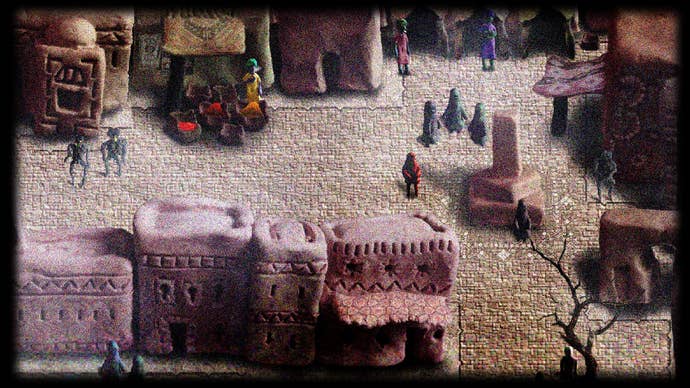
Dujanah
Available on: PC, Mac, Linux for $8.99
This can probably be said about many games on this list: but there honestly wasn't any other game quite like developer Jack King-Spooner's Dujanah this year. Part "claypunk." Part pixelated hooplah. Part long-lost C64 game. Part adventure game. Part whatever the heck is going on in it; mechanically, narratively, audiovisually. Dujanah is the sort of game that defies genres and defies any sort of strict definition at all. Dujanah just is.
But if I were to attribute something to it, it'd be that it's a game about death at its core, dealing with all the baggage that comes with death as you traipse across its Islamic majority locale. In Dujanah, you meet people, friendly beasts, a giant spider man (no, not that Spider-man). You cruise across overworlds and wade through visual novel-like sections. Its visual inclination changes drastically at the drop of a hat. So yeah, believe me when I say this: Dujanah is like nothing else you'll play this year.
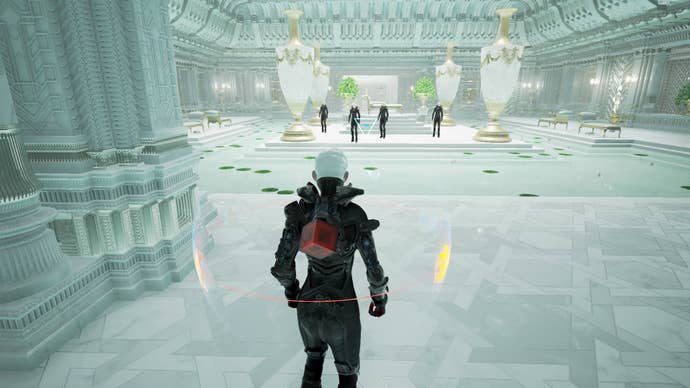
Echo
Available on: PS4, PC for $24.99
Echo, from ex-Hitman developers who make up new studio Ultra Ultra, is the sort of high-minded sci-fi that I live for. Its world is needlessly detailed, but impeccable in its execution. It takes itself maybe a hair too seriously. And yet, I wouldn't change a thing about Echo.
So imagine you're in its world for a moment. You're En, a girl who wakes up from a century in cryogenic sleep. Her friend and confidant Foster mysteriously (and seemingly) died rescuing her all those years ago. But now En's awake, with a cynical AI barking orders at her. En is on the hunt for The Palace; a lavishly decorated, seemingly infinite, pristine place. She finds it, but what she discovers in its shiny walls is disturbing: Echoes, or clones of her, who remember her every move. But actually it's The Palace that remembers.
Thus begins the intense challenge of Echo. In Echo, nearly everything you do—whether you're stealthy or guns-blazing—is remembered by your environment, and more importantly, by your foes. It's your job to switch up whatever strategy you're using to your advantage, and remember what you did on your last skip through a level. Because at the end of the day, forgetting how you once played could spell defeat.
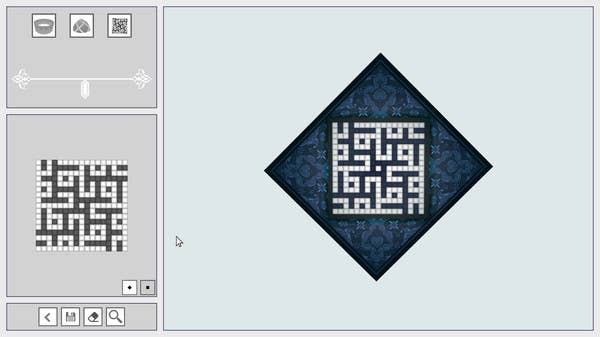
Engare
Available on: PC, Mac for $6.99
I am awful at math. It's the sole reason why I graduated college a semester later than I was supposed to. It's kind of plagued my existence, my entire life. And yet, game designer Mahdi Bahrami's geometric art game Engare captured my attention wholeheartedly this year.
Engare doubles as both a tool and a puzzle game. You design perfectly balanced shapes and flat drawings, composed of all sorts of geometric shapes. Plus, you can even export the 3D creations you make with its sandbox tool. Bahrami's game isn't just an ode to the beauty of geometry, it's more so a celebration of the calculated perfection that's seen within Islamic art. While Engare didn't make me a mathematician or anything, it made me appreciate geometry a little bit more.
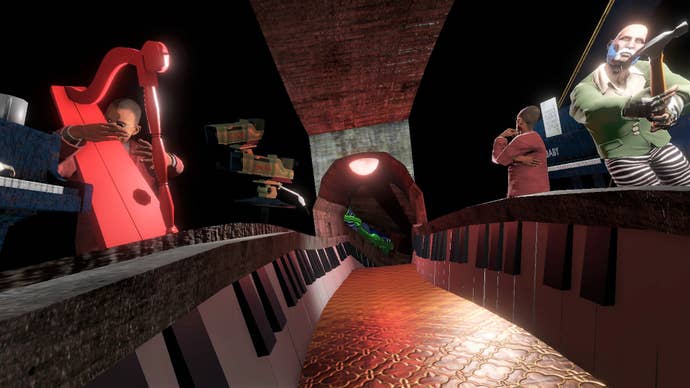
The Norwood Suite
Available on: PC, Mac for $9.99
Cosmo D isn't like most developers, and The Norwood Suite isn't like most games. It's the follow-up to Cosmo D's own feverish Off-Peak, but in tone, it couldn't be more different. Whereas Off-Peak feels chaotic, The Norwood Suite pumps the brakes a bit more; it's heavily jazz-inspired in structure, and it's smooth and surreal to match it. In the game you explore an odd hotel, meeting the guests and navigating its spaces. But at its core, it's still a music game; just it's a music game that isn't rhythm oriented. The music instead drives the action, and everything around it.

Oikospiel
Available on: PC, Mac for Price Determinate on Your Income (for me it's $5.33)
David Kanaga's Oikospiel is a five-part dog opera about game development. You play as dogs and other animals, and that's all you need to really know.
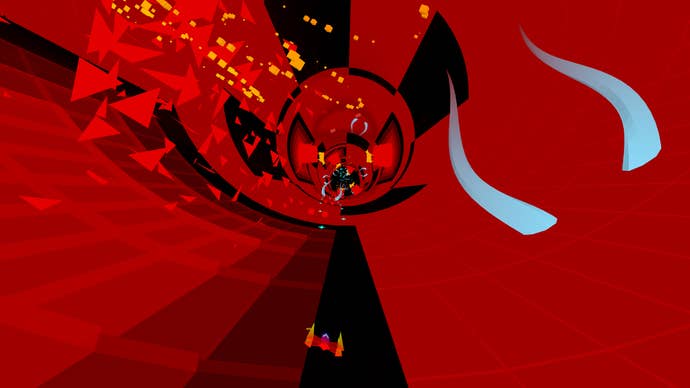
Polybius
Available on: PS4, PSVR for $15.49; Coming Soon to PC
You've probably heard the myth about Polybius. The passed down tales of an arcade game that mentally disturbed all who played it, and the government monitored its sole cabinet for data. Then it disappeared, without a trace. Game designer Jeff Minter tried to recreate the arcade game to astounding effect. The result, also named Polybius, is at its best when it's played in VR: its intense speeds and glitchy interface all but consume the player. If nothing else, Polybius feels like the closest we'll ever get to those faux-games that brainwash people in bad procedural crime dramas. After an hour or so of Polybius in VR, it may as well have brainwashed me.
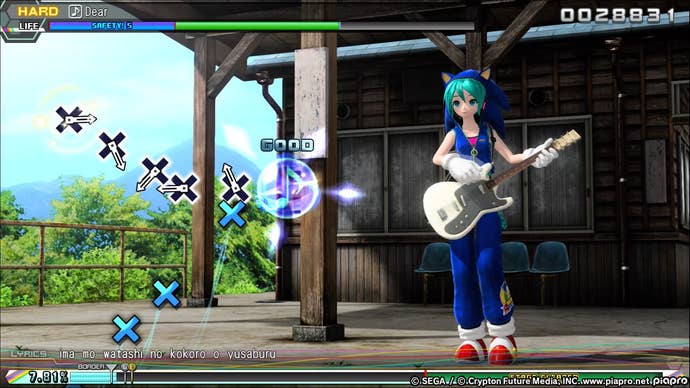
Hatsune Miku: Project Diva Future Tone
Available on: PS4 for $53.99
The Project Diva series is the greatest still-running rhythm game series. Trust me on this. While its fanbase is diehard, a lot of times when I sing praises of Sega's Vocaloid rhythm games, they seem to fall upon deaf ears. Folks either don't know about the series, or are turned off by its electronic-saturated J-Pop focus. (Or they're seemingly allergic to the idea of digital pop stars. Go figure.)
But trust me when I say this: Project Diva Future Tone is the rhythm game of your dreams, if you're a fan of rhythm games (and the music of a certain teal haired digital pop star). Project Diva Future Tone is like all the games before it, but without the bullshit. There's no raising sim elements. No gift giving. No decorating rooms. Project Diva Future Tone is just a rhythm game with hundreds of songs, which is much more than the average 20 to 30 per game. Future Tone features the familiar hits and some unexpected tunes. It's a rhythm game with so much music, that it's nearly impossible to not find something you'll dig. Future Tone may have flown under the radar this year after releasing in January 2017, but it's a dense arcade port that feels like a playground for Miku fans and beyond.
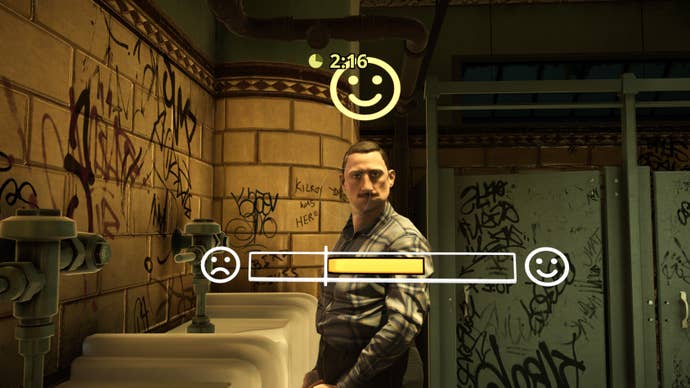
The Tearoom
Available on: PC, Mac, Linux for free
"You can't have sex without politics, and you can't really have politics without sex either," game designer Robert Yang told me over the summer, as I talked to him about the recent release of his latest game The Tearoom, a "historical bathroom simulator." Yang's an experimental game designer, known for his gay-inclined games that often get banned on Twitch for mysterious reasons (they won't tell him why). The Tearoom is a depiction of the Tearoom Trade from a surveillance-tapped bathroom in Mansfield, Ohio, where police once sought to out men for consensually soliciting sex.
There's a stark difference in The Tearoom though. The game isn't explicit in any particular way. Instead, you're tasked with licking men's guns. Literal guns. Flesh-covered guns that dangle where a dick usually would be. When you're successful (and hopefully don't get busted by the police) the guns join your arsenal in your personal bathroom stall. The Tearoom is a tense game at its core, perfectly emulating the fear men had (and still have in the existing tearooms today) when trying to just live their lives freely, if only for a moment.
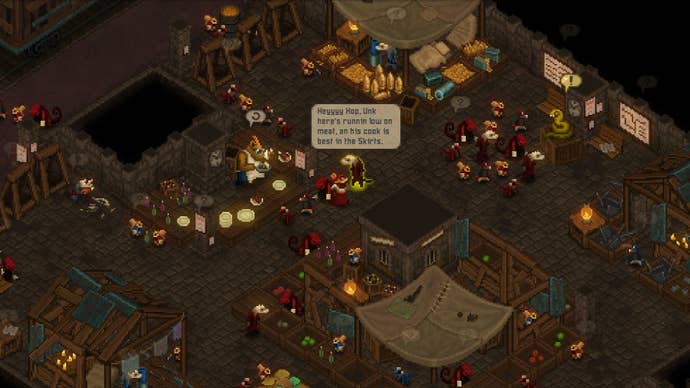
Tooth and Tail
Available on: PS4, PC, Mac, Linux for $19.99
Pocketwatch Games' Tooth and Tail looks cute on the surface, but don't be fooled. It's really like a fantasy-inclined Watership Down in RTS form. Tooth and Tail peeped out for release back in September, mere days after Destiny 2 came out swinging. As a result, the poor RTS seemed to be buried, as with many games that released that month. Tooth and Tail is not only a solid RTS with single-player, split-screen, and more, but it has gorgeous art direction too. Its fields sway with the wind; the character icons are lushly illustrated. Tooth and Tail is an RTS game with a clear vision. In a lot of RTS games—sorry, it's true—ones with solid art direction are sometimes hard to come by. But Tooth and Tail rises to the challenge.
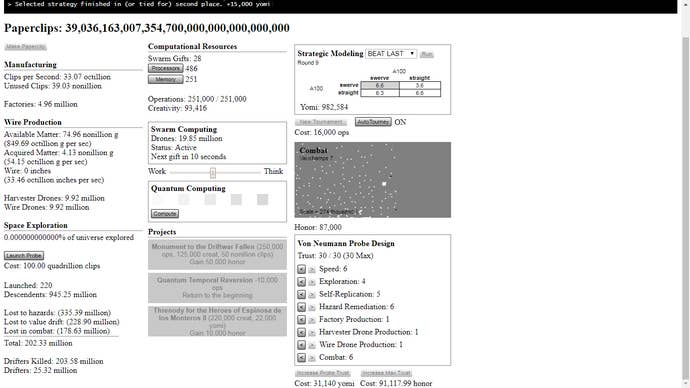
Universal Paperclips
Available on: Browsers for free
Clicker games are kind of the worst, aren't they? And yet, they're addictive, and we play them oh-so much. In Universal Paperclips, you're an AI who wants nothing other than paperclips. Then things get out of control. Your business grows exponentially. The world around you falls apart. But still, you are steadfast in your goal: paperclips, paperclips, paperclips. That's the weird beauty of this year's best clicker game from NYU Game Center director Frank Lantz. Universal Paperclips builds upon our worst tendencies: to click things, and shows us the evil underbelly of it all.

